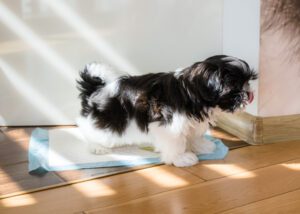Potty training is a fundamental aspect of raising a healthy and well-behaved puppy. At Kryder + Harr Veterinary Clinic in Granger, IN, we understand the challenges and joys that come with this important task. This blog aims to offer practical tips for pet owners embarking on the journey of potty training their puppies. Our team is always ready to assist with your pet care needs, and we encourage you to contact us at (574) 277-6533 for further guidance and support.

The Importance of Potty Training Your Puppy
Potty training is more than just a convenience; it’s an integral part of your puppy’s development. Proper potty training helps prevent unwanted accidents in the house, which can save your carpets and furniture from damage. It also establishes a routine for your puppy, aiding in their overall behavior and adjustment to their new home. A well-trained puppy is a happy puppy, and it makes for a more harmonious household.
Step 1: Create a Consistent Schedule
The key to successful potty training is consistency.
Create a Feeding Schedule: Start by establishing a regular feeding schedule by feeding your puppy at the same times each day. This predictability helps regulate your puppy’s bathroom habits, making it easier for you to anticipate when they need to go outside.
Frequent Bathroom Breaks: Take your puppy out first thing in the morning, after meals, after naps, and before bedtime. Consistent timing reinforces good habits and helps your puppy understand what is expected of them.
Step 2: Choosing the Right Location
Designate a Bathroom Area: Select a specific spot outside for your puppy to use. Consistently taking your puppy to the same location helps them associate that spot with bathroom breaks. When they successfully go in the designated area, reward them with praise or a treat to reinforce positive behavior.
Use Cue Words: Introduce a cue word like “potty” when you take them to their spot. This association helps them understand the purpose of going outside.
Step 3: Positive Reinforcement Works Wonders
Reward Good Behavior: Positive reinforcement is a powerful tool in puppy potty training. When your puppy does their business in the right place, immediately reward them with praise, affection, or a small treat. This positive feedback encourages them to repeat the desired behavior.
Avoid Punishment for Accidents: Instead of scolding your puppy if they have an accident, gently redirect them outside. Negative reactions can cause fear, anxiety, and confusion in your puppy.
Step 4: Handling Accidents with Patience
Respond Calmly to Accidents: Accidents are a normal part of the potty training process. If your puppy has an accident, calmly clean it up without making a fuss. Use an enzymatic cleaner to remove the scent and discourage repeat offenses. Remember, patience is paramount. Puppies are learning, and it takes time for them to fully grasp potty training.
Supervision is Key: Keep a close eye on your puppy, especially after eating or playing. Recognizing signs they need to go can prevent many accidents.
Step 5: Crate Training as a Tool
Safe Space: Use a crate to create a comfortable, safe space for your puppy. Dogs naturally avoid soiling their den, which helps regulate their bathroom habits.
Crate Time Limits: Ensure your puppy isn’t in their crate for too long. Puppies can only hold their bladders for a few hours.
Step 6: Monitoring Your Puppy’s Progress
Observe and Adapt: Keep an eye on your puppy’s progress and adjust your approach as needed. If you’re noticing frequent accidents or a lack of progress, it might be time to revisit your training strategy.
Patience and Consistency: Consider whether your puppy’s bathroom schedule is consistent, if the designated bathroom spot is working, and if there’s a need for more frequent bathroom breaks. Remember, each puppy learns at its own pace. Consistent practice and patience are critical to successful potty training.
Need Professional Advice from Our Veterinarians?
Potty training your puppy requires patience, consistency, and positive reinforcement. By following these steps, you’ll be well on your way to having a well-trained puppy. Every puppy is unique, so adjust your approach to fit their individual needs, and if something isn’t working, don’t hesitate to let us know! For more guidance on puppy care and potty training, contact Kryder + Harr Veterinary Clinic in Granger, IN at (574) 277-6533.
Recent Posts
About Us
Welcome to Kryder & Harr Veterinary Clinic! Our animal hospital has been a fixture in the Granger community since 1981, practicing full-service veterinary medicine for all our pet parents and their furry family members. At KHVC, we pride ourselves on our history, of providing excellent customer service for our clients, along with dedicated, compassionate, and exceptional medical care for all of our patients.
